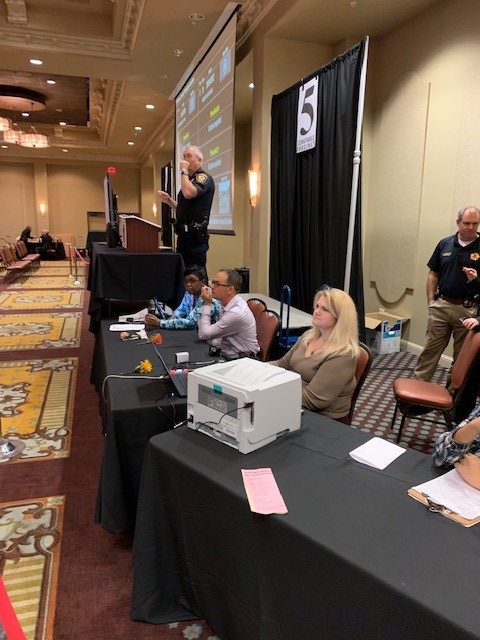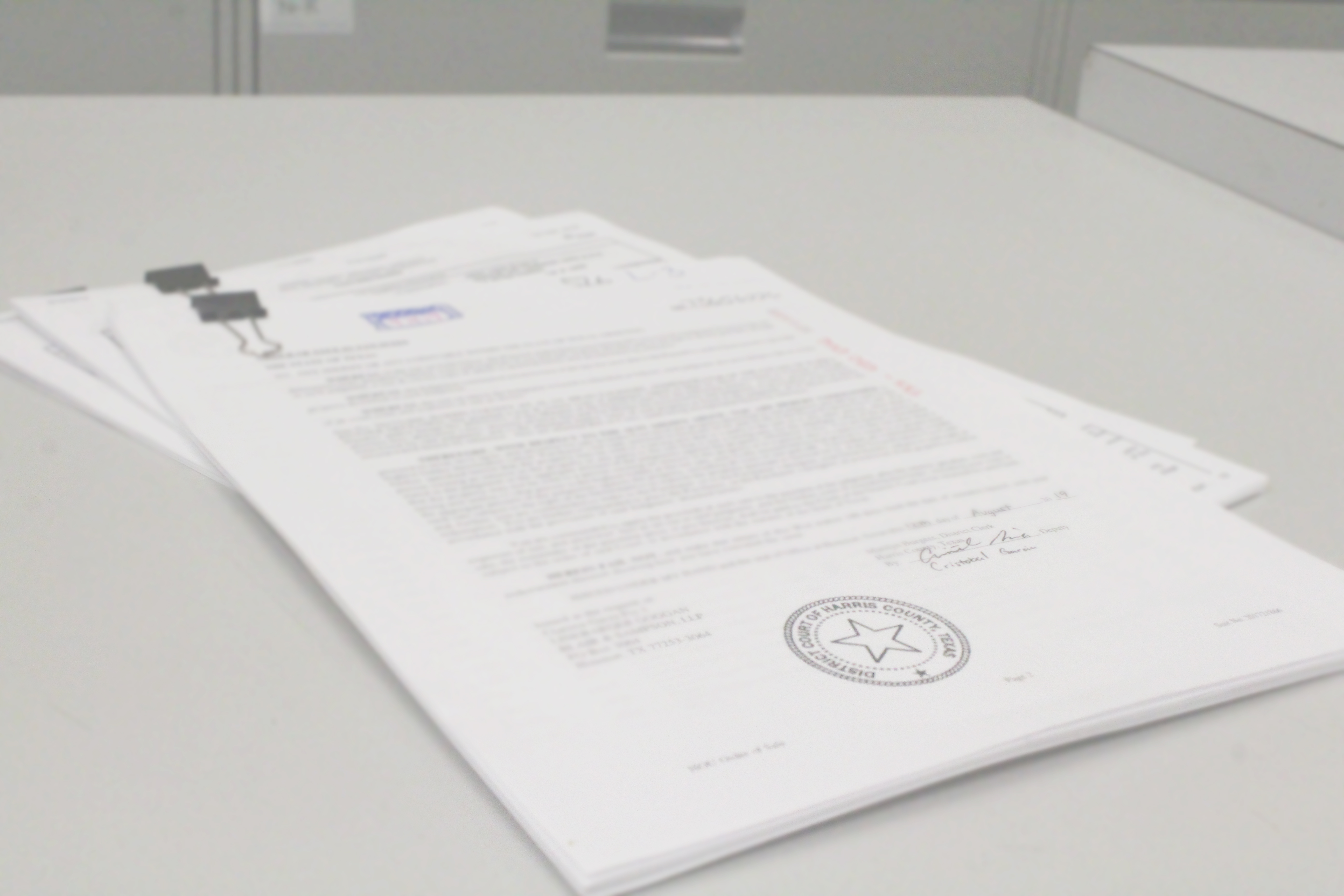The Civil Process Division
The Civil Process Division responsibilities include but is not limited to, processing court orders - receiving, recording, serving, and returning legal documents to the courts from which they originated. Such documents include Subpoenas, 24 Hour Eviction notices, Protective Orders etc. The officers’ written return (their report) on each document notifies the court that the order or notice has been served or not served.
The Civil Process Division operates at the forefront of technology with each Precinct 5 civil deputy utilizing an I-Pad application. This application provides the deputy the ability to update information on civil process from the field.


The Writ Division
If the Civil Process Division processes court orders, the Writ Division enforces the court’s decisions regarding those orders. The most common of these decisions is in the form of a “Writ of Execution”. This type of court order “commands” the Constable to collect the court’s judgment through seizure of money and/or of property, and the subsequent sale of this property to satisfy a judgment.
Court Orders include but are not limited to pre-judgment Writs such as: Attachments, Sequestrations, Garnishments, Receiverships, and Injunctions and Post Judgment Writs such as: Executions, Execution Order of Sale and Writ(s) of Possession for Property and People.
For information regarding associated service fees click here.
The Writ Division also conducts Real Property Sales
Real Property sales are conducted at the Bayou City Event Center 9401 Knight Road Houston, TX 77045 on the first Tuesday of every month form 10:00 AM to 4:00 PM.
There are four types of sales: 1) Execution 2) Execution and Order of Sale, 3) Tax Sales, and 4) Tax Resales.
The Eviction Process
There are four steps in the Eviction process:
Notice to Vacate
Filing the Suit
Going to Court
Writ of Possession
Notice to Vacate
If a landlord alleges a tenant is behind on rent or has a lease violation, the Landlord is required by law to give the tenant a three day written notice to vacate the premises. For all other violation(s) of the lease, a 30 day notice is required, unless, stipulated in the language of lease agreement.
How to deliver the notice options…
- In person – Personally delivered to the tenant or any person residing at the premises who is 16 years of age or older.
- Personally delivered – to the premises by attaching the notice to the INSIDE of the main entry door.
- By mail – By regular mail, Registered mail or certified mail, return receipt requested, to the premises in question.
- If above options will not work – Securely affix the notice to the outside of the main entry door in an envelope with the tenant’s name, address and the word “IMPORTANT DOCUMENT” or similar language. By 5pm of the same day deposit in the mail a copy of the notice to the tenant.
**The Texas Property Code 24.005 requires the Landlord to deliver the written notice, and then wait three days before filing your suit in Justice Court. This is a legal requirement which must be met and cannot be overlooked. If a landlord is requesting attorney’s fee, the landlord must give a 10 day Notice to vacate.
Filing the Suit
You must file an original petition with the Justice Court in the precinct where the property is located and pay the appropriate fees. These court costs pay for filing your suit, your court hearing, and for the Constable to serve the citation. The citation is the notice to the tenant that you are attempting to evict them.

Going to Court
You must go to Court and prove your case by the preponderance of the evidence. Simply filing a suit does not mean you will win your suit. You should bring all documents and other evidence with you to court in a well-organized fashion. At the hearing, you will have to present evidence to show that you are entitled to possession of the premises.
Writ of Possession
A writ of Possession is a court order to the Constable to place a property owner in possession of their property. To file a Writ of Possession the below criteria must be met.
- Win your suit in Court.
- The five day appeal period must have passed.
- The other party is still occupying the premises.
- The writ must be filed in the court in which the original suit was filed.
FAQ's
First of all, what is civil law?
In Civil law, a party files suit to claim redress (remedy) in the form of money and/or property.
Civil law encompasses non-criminal matters.
Where can I find a list of properties to be auctioned?
There are various sources available:
- Posted at the bayou City Event Center – On the day of sale
- 17423 Katy Freeway – Lobby
- Both Precinct 5 JP Courts
For the taxing jurisdictions they represent, the following law firms also post properties being sold for delinquent taxes on their websites:
- Linebarger Groggan Blair & Sampson, LLP at lgbs.com
- Perdue Brandon Fielder Collins & Mott, LLP at pbfcm.com
How can I bid on property scheduled to be auctioned?
You must register to bid with the Harris County Tax Office before you can bid at the Tax Auction. You can find Registration information at https://hctx.net/Property/TaxSales/TaxSales. You can register online at any time or in-person on the day of the auction beginning at 8:30 am. Your bidder registration is valid for one year from the date of issuance, and may be renewed upon certification by the applicant that no delinquent property taxes are owed to the County or its taxing entities.
When and how do I pay for a property?
You must pay for the property at the time of the sale. Only cash or certified funds (cashier’s check) are accepted. Certified checks should be made payable to the selling Constable precinct.
Can I go to the bank for money and come back and pay?
No, you must pay for the property at the time of the sale. The County may pursue legal actions for non-payment or rescind the winning bid.

What type of document is issued when I purchase a property?
A receipt will be issued on the day of sale. The successful bidder on a property will be issued a Constable’s Deed within 4 to 6 weeks after the auction. The name indicated below the Registrant’s Name on you bidder card will be the name appearing on the Constable’s Deed.
Can I Return the property I purchased at auction?
All sales are final and not subject to rescission due to mistake or dissatisfaction with the property. The county may pursue damages against a bidder who rescinds on a purchase.
How can I redeem my property if it was sold?
Most properties sold at Tax Sale are subject to the defendant’s right of redemption. If the defendant in the tax suit wants to redeem their property, they must contact the purchaser. If the defendant is unable to locate the purchaser or agree with them on the redemption amount, they may tender a Redemption Affidavit along with the redemption amount to the Tax Assessor-Collector. If the redemption tender is accepted, a Receipt for Redemption is issued to the defendant to file with the County Clerk. (See Tax Code Ch. 34 Subsection B).

The Civil Process and Writs Division is also responsible for Justice of the Peace court protection.
There are two Justice of the Peace courts within Precinct 5: Position 2 Judge Jeff Williams and Position 1 Judge Russ Ridgway. These two courts handle both civil and criminal cases. The Constable's Offices in Harris County are responsible for courthouse safety and Precinct 5 has deputies assigned to the JP Courts. The deputies are responsible for maintaining order and security within the courtrooms as well as acting upon orders issued from the presiding judge.
Position 1 Judge Israel Garcia
6000 Chimney Rock Suite 102 Houston, TX 77081
Main Number (713) 274-0800
Position 2 Judge Jeff Williams
16715 Clay Rd. Suite 4 Houston, TX 77084
Main Number (713) 274-0800
 The Office of Constable Ted Heap, Harris County Precinct 5 Civil Process and Special Writs Divisions are located at 17423 Katy Freeway, Houston Tx. 77094.
The Office of Constable Ted Heap, Harris County Precinct 5 Civil Process and Special Writs Divisions are located at 17423 Katy Freeway, Houston Tx. 77094.
For questions regarding Civil Process, please contact us at (832) 927-6740
For questions regarding Special Writs, please contact us at (832) 927-6750
Please note that we are not able to provide legal advice and will not answer any legal questions you may have. We recommend that you consult an attorney for legal guidance and questions.
